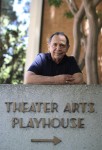Don’t be afraid to be dangerous. This was the most memorable lesson theater director and UCLA alumnus Michael Peretzian learned during his time at the university.
“When you direct, you have to have danger,” Peretzian said. “You don’t know what’s going to happen, even if it’s just a conversation between two people on a park bench. That’s the most important element that I’ve tried to infuse in everything I do.”
Peretzian said he incorporates this concept in his direction of his latest project, “Dying City,” a play written by Christopher Shinn, which opened this past weekend at the Rogue Machine Theatre.
Although his love of theater has lasted for decades, Peretzian said it was a long road that led him to this point at which he devotes himself completely to theater direction. Growing up on Alfred Hitchcock’s horror movies, he said he came to the UCLA School of Theater, Film, and Television wanting to be a movie star. He graduated with a passion for theater direction but it would be a long time before it would become his sole focus.
A few years out of college, Peretzian said he was working in the mailroom of a talent agency when a chance encounter involving Steve McQueen convinced him to pursue a career as an agent. He worked as an agent for 38 years, representing talented artists from all over the world, including Christopher Shinn and Michael Cristofer, award-winning writer of the play, “The Shadow Box,” and currently an actor on “Smash.” He said he was mainly focused on helping struggling playwrights.
“A lot of these playwrights from New York and other places needed somebody in Los Angeles at an agency who understood what they did in the theater and that ended up being a wonderful combination for me,” he said. “I worked for some really very talented people, Pulitzer Prize winners, Tony Award winners and Academy Award winners. And I learned so much from them, watching them work.”
Despite the perks of working at the agency, from free seats at the Academy Awards to working with celebrity clientele, Peretzian said he missed directing theater. He started moonlighting as a theater director, and when he resigned from the agency, he devoted himself completely to his former creative passion.
Although his acting dreams ended in college, Peretzian said his acting background has been valuable to him as a director, helping him make casting decisions and work with his cast to push their limits and portray their characters as honestly as possible. Barbara Rottman, a UCLA alumna and one of Peretzian’s friends from college, said his sensitivity and curiosity are key to his success as a director.
“He wants your creativity to be part of it,” Rottman said. “He’s not a dictator, yet he has a very firm understanding. He’s very open to explore, and I think that’s beautiful because you trust him and you trust his judgment and he supports you in your own quest as part of the process.”
Peretzian said his acting instinct helped him choose the cast for “Dying City.” At auditions, he asked each actor what they wanted him to know about them before leaving the room. He said that their answers, whether they repeated their credentials or offered personal information, told him a lot about them as actors.
“That was what I needed to find out: how articulate an actor was about who they were because that’s what you have to work with as an actor,” he said.
Peretzian said the casting was crucial to this play since it requires actors with wide emotional range who are willing to take risks. The show tells a story of the wife and brother of a soldier who was killed during the Iraq War as they grapple with his death and reflect on his life.
“It seems like a simple story of a dysfunctional marriage, but it really tells the story about who we are as Americans, how we get involved in things like the Iraq War, how we come to believe that it’s right without question,” said John Flynn, the artistic director at the Rogue Machine Theatre.
Peretzian said he hopes the audience connects to the play’s message about the internal struggle all people face with the inherent tendency for violence.
He said what he really enjoys most is telling stories, and that he knows he has succeeded when the audience loses themselves so fully in the art that they forget about all the distractions of everyday life.
“With great art, whether it’s a visual art or a movie or a play, if you really forget where you are, you come out of that experience connecting to the world differently,” Peretzian said. “You come back to the world thinking of things you haven’t thought of or maybe would never have thought of if it weren’t for that experience.”
